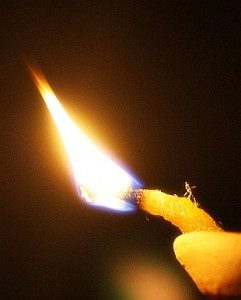 There is an interesting interruption at the beginning of this week’s reading. Last week we learned about the construction of the Mishkan, the Tabernacle, and this week we learn about the garments worn by the Kohanim, the Priests, when they served within it.
There is an interesting interruption at the beginning of this week’s reading. Last week we learned about the construction of the Mishkan, the Tabernacle, and this week we learn about the garments worn by the Kohanim, the Priests, when they served within it.
Yet the Torah portion begins by talking about the Ner Tamid, the lamp which was to burn continually — specifically describing the preparation of the oil — and this seems to be out of place. It would seem to make more sense to describe the construction of the Tabernacle, the garments to be worn, and only then describe the services to be conducted. The Kli Yakar cites the Abarbanel, who says that really this belongs in Parshas Emor, where this Commandment is said along with the Lechem HaPanim, the show-bread offering.
Why is the Torah “jumping the gun,” so to speak, to talk about lighting the lamp now [Ex. 27:20-21] — especially as it will say it again?
The Chasidic Masters use this verse as a parable speaking to each individual. This places the passage into context, preceding the description of the priestly raiments. Their regal dress could lead a Kohen to regard and carry himself with honor — especially the Kohen Gadol, the High Priest, who wore unique and very expensive garments.
On the contrary, they say. The priestly raiments were not about the Kohen himself, but about the service he was called upon to do. It was about Whom he was serving. The verse says “Kasis L’Maor” — crushed for lighting. A person must view himself as “crushed,” as lowly and unimportant. However, says the Chashvah L’Tovah, this does not mean a person should be depressed and have no desire to produce. On the contrary: the point of feeling crushed and down is L’Maor — in order to light! A person should feel grateful to G-d for all his or her positive traits, rather than proud or haughty, and be moved to use them productively.
And, like the Kohen, using our gifts productively means in the Divine Service. “Because the lamp [of G-d] is a Commandment, and Torah is the light” [Proverbs 6:23]. It says in our verse, “l’haalos ner tamid” — to bring up a constant light. We must constantly light the fire of Torah within ourselves. This way we will not feel down even in the dark of night.
